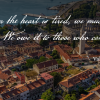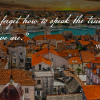
Published: March 15, 2001
View the Original Newsletter: Iskra-78.pdf
About This Issue
Iskra No. 78 explores a defining question for Croatians abroad — should the diaspora have the right to vote? In her Motrišta column, Valentina Krčmar delivers a stirring reflection on democracy, belonging, and gratitude, defending the moral dignity of Croatians who stood by their homeland during the war. The issue also features reports from Croatia, updates on community life in Canada, and practical health advice.
Editorial: “Hunger in Croatia”
Valentina begins this issue shaken by news from home. Reports of hunger in Croatia, particularly in regions once known as the nation’s breadbasket, leave her heartbroken.
“I knew times were hard — but hunger? I never thought it would come to that.”
She urges readers to set aside political bitterness and act. Even though the diaspora feels unappreciated by the Croatian government, she reminds them that compassion must prevail over pride.
“We are angry, yes — but when a child goes hungry, that anger means nothing. In Lent, let us deny ourselves something small and help those who need us most. Croatia needs us again.”
Her message transforms frustration into solidarity — a call to generosity beyond politics.
Motrišta: “Democracy and the Right to Vote”
In one of her most impassioned essays, Valentina confronts the Croatian government’s proposal to revoke voting rights for Croatians living abroad.
She admits she personally never felt morally entitled to vote in Croatia, since she does not live there. Yet she is outraged at the idea of being stripped of that right entirely.
“I, who never use my right to vote, feel insulted that it could be taken from me — because it is a right given by God. I am Croatian, wherever I live.”
Valentina recalls how, during the Homeland War, the diaspora worked tirelessly to support Croatia — lobbying, fundraising, and sacrificing.
“While people in Croatia and Bosnia were dying, we lived without rest. And now, Prime Minister Račan, you say we do not deserve the right to vote?”
She accuses both the ruling coalition and the opposition of misunderstanding democracy.
“Those in power use the word ‘democracy’ to silence voices they fear. The opposition uses it to hope for a return to power. But democracy means allowing everyone to speak — especially those who disagree.”
Valentina argues that denying diaspora Croatians the vote is both unjust and politically foolish:
“One of the truest signs of democracy is the right to vote for all citizens, wherever they live. This, Mr. Račan, is a great mistake.”
She also criticizes how the diaspora has been alternately exploited and ignored by successive governments, and laments that many Croatians in the homeland still do not know how much the diaspora contributed during the war.
Her conclusion is both humble and defiant:
“I still will not vote, because I believe I have no moral right to. But everything in me rises against this injustice. Taking away our vote is taking away our voice.”
National and International News
Iskra provides detailed coverage of political and social issues shaping Croatia and its neighbors:
-
Bosnia and Herzegovina: Dražen Budiša presents a proposal for restructuring Bosnia into multiethnic cantons, supported by several members of Croatia’s ruling coalition.
-
Unemployment Crisis: Nearly 389,000 Croatians are out of work, with growing social unrest.
-
Church Response: Bishops from the Split Metropolis, led by Mons. Ante Ivas, speak from Knin, urging politicians to “stop talking and help people earn their bread.”
-
Sports Triumph: Skier Janica Kostelić becomes Croatia’s first-ever overall World Cup champion — a bright symbol of perseverance and pride.
Community Life in Canada
In Canada, the Croatian community continues to thrive and connect:
-
The Folklorni Ansambl “Hrvatska” in Mississauga celebrates its 30th anniversary with a concert and dinner event.
-
Monsignor Vladimir Stanišić marks his 50th year of priesthood at the Church of the Croatian Martyrs.
-
The General Consulate of Croatia organizes a 2001 census outreach for citizens abroad, encouraging them to participate.
The community also hosts film screenings of classic and contemporary Croatian cinema at Toronto’s Art Gallery of Ontario — part of an effort to preserve and share national culture.
Health and Wellness: “Asthma and Ear Infections”
Dr. Darko Desaty contributes two in-depth health articles:
-
Asthma: A comprehensive guide to symptoms, triggers, and modern treatments, emphasizing prevention and patient awareness.
-
Ear Infections: Guidance for parents on recognizing and treating ear inflammation in children, with practical tips and contact information for Canadian health associations.
“Health is the greatest wealth — and the greatest happiness is to recover.”
Reflections and Humor
A lighthearted column by Titoljub Jugičić humorously dissects the contradictions of Balkan democracy, while Biserka Milinković reflects on everyday kindness — reminding readers to offer seats to the elderly or parents with small children in church.
Valentina also praises the work of Croatian-Canadian artists such as Ante Sardelić and Nađa Rafaj, urging the community to support local cultural initiatives.
“These are the people who put our feelings into color and form — they deserve our respect.”
Closing Thoughts
The final tone of Iskra No. 78 is reflective yet hopeful. Through her deep moral reasoning and emotional honesty, Valentina challenges both homeland and diaspora Croatians to hold onto what truly matters — faith, compassion, and the courage to speak the truth.
“We are part of the same story, written in two places. Let us not erase one another from its pages.”




